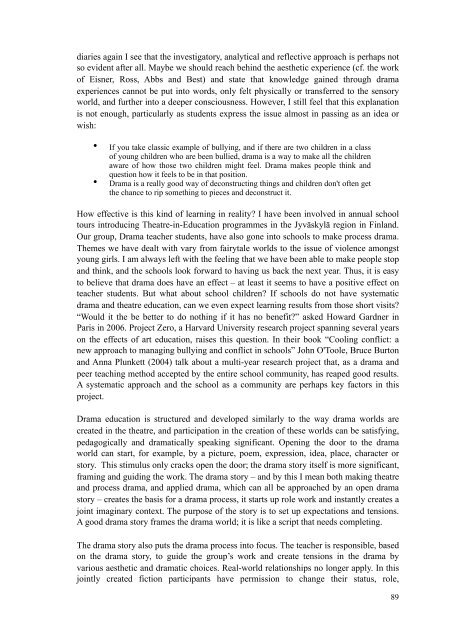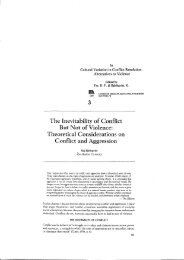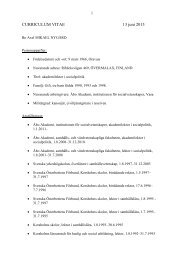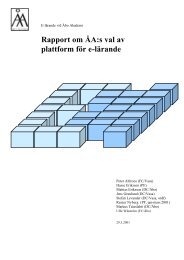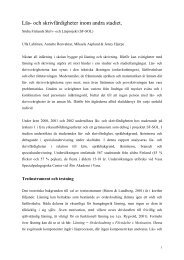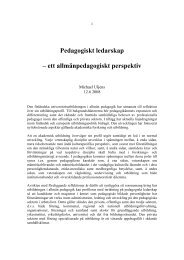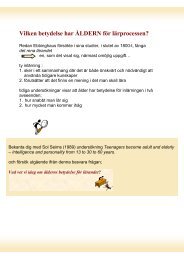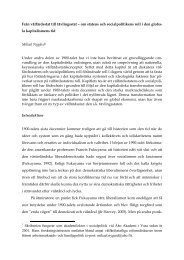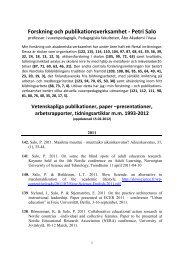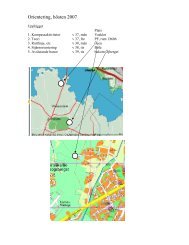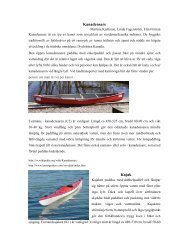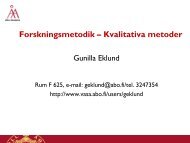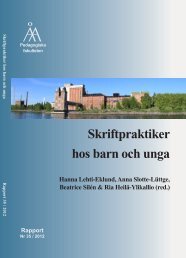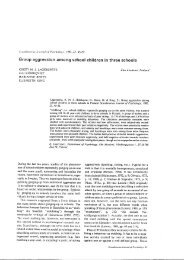Drama Boreale - Åbo Akademi
Drama Boreale - Åbo Akademi
Drama Boreale - Åbo Akademi
You also want an ePaper? Increase the reach of your titles
YUMPU automatically turns print PDFs into web optimized ePapers that Google loves.
diaries again I see that the investigatory, analytical and reflective approach is perhaps not<br />
so evident after all. Maybe we should reach behind the aesthetic experience (cf. the work<br />
of Eisner, Ross, Abbs and Best) and state that knowledge gained through drama<br />
experiences cannot be put into words, only felt physically or transferred to the sensory<br />
world, and further into a deeper consciousness. However, I still feel that this explanation<br />
is not enough, particularly as students express the issue almost in passing as an idea or<br />
wish:<br />
• If you take classic example of bullying, and if there are two children in a class<br />
of young children who are been bullied, drama is a way to make all the children<br />
aware of how those two children might feel. <strong>Drama</strong> makes people think and<br />
question how it feels to be in that position.<br />
• <strong>Drama</strong> is a really good way of deconstructing things and children don't often get<br />
the chance to rip something to pieces and deconstruct it.<br />
How effective is this kind of learning in reality? I have been involved in annual school<br />
tours introducing Theatre-in-Education programmes in the Jyväskylä region in Finland.<br />
Our group, <strong>Drama</strong> teacher students, have also gone into schools to make process drama.<br />
Themes we have dealt with vary from fairytale worlds to the issue of violence amongst<br />
young girls. I am always left with the feeling that we have been able to make people stop<br />
and think, and the schools look forward to having us back the next year. Thus, it is easy<br />
to believe that drama does have an effect – at least it seems to have a positive effect on<br />
teacher students. But what about school children? If schools do not have systematic<br />
drama and theatre education, can we even expect learning results from those short visits?<br />
“Would it the be better to do nothing if it has no benefit?” asked Howard Gardner in<br />
Paris in 2006. Project Zero, a Harvard University research project spanning several years<br />
on the effects of art education, raises this question. In their book “Cooling conflict: a<br />
new approach to managing bullying and conflict in schools” John O'Toole, Bruce Burton<br />
and Anna Plunkett (2004) talk about a multi-year research project that, as a drama and<br />
peer teaching method accepted by the entire school community, has reaped good results.<br />
A systematic approach and the school as a community are perhaps key factors in this<br />
project.<br />
<strong>Drama</strong> education is structured and developed similarly to the way drama worlds are<br />
created in the theatre, and participation in the creation of these worlds can be satisfying,<br />
pedagogically and dramatically speaking significant. Opening the door to the drama<br />
world can start, for example, by a picture, poem, expression, idea, place, character or<br />
story. This stimulus only cracks open the door; the drama story itself is more significant,<br />
framing and guiding the work. The drama story – and by this I mean both making theatre<br />
and process drama, and applied drama, which can all be approached by an open drama<br />
story – creates the basis for a drama process, it starts up role work and instantly creates a<br />
joint imaginary context. The purpose of the story is to set up expectations and tensions.<br />
A good drama story frames the drama world; it is like a script that needs completing.<br />
The drama story also puts the drama process into focus. The teacher is responsible, based<br />
on the drama story, to guide the group’s work and create tensions in the drama by<br />
various aesthetic and dramatic choices. Real-world relationships no longer apply. In this<br />
jointly created fiction participants have permission to change their status, role,<br />
89


